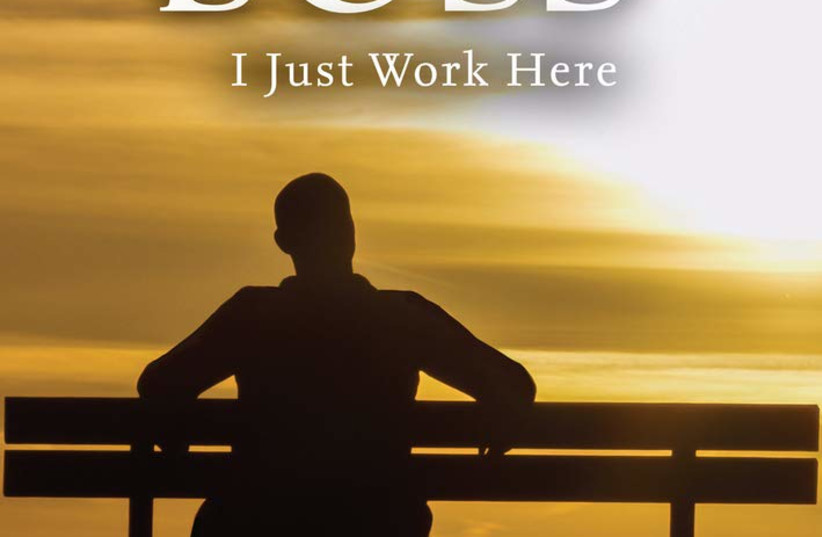Those of us watching Howard Jonas build his IDT empire in the 1990s saw big towers in Newark and Jerusalem housing a telecom and remote employment revolution. We could have guessed the Modern Orthodox entrepreneur was getting seriously wealthy. We could not have guessed that he was also getting seriously depressed.
I’m Not the Boss, first published in 2004, was reissued in September 2020 to tell the inspirational story of Jonas’s mental-health struggles and how his faith was strengthened in the process.
“This book is here to tell you there is no mental, spiritual, or emotional depth from which you cannot rise. It is here to tell you that God is always there to help. The argument that God doesn’t exist because bad things happen to good people is a fallacy,” he writes.
Adopting a conversational rather than a pedantic tone, Jonas presents a simple – but not simplistic – theodicy based on the premise that “the most important thing, from God’s point of view, is that people... have free choice.”
From there it follows that “it is at least sometimes necessary for the good to suffer and the wicked to thrive. Anything less would eliminate choice. In an even larger sense, the Ultimate Power in the universe and the Supreme Advocate for good must hide Himself in order to preserve free choice. He must make His existence a matter of speculation and faith. Were His existence and power to be manifest and obvious, free choice would be eliminated, as surely as a police car standing at the corner eliminates the temptation to run a red light.”
Even when Jonas “lost hundreds of millions of dollars drilling for oil that wasn’t there and promoting technologies no one wanted to buy,” when he dealt with near bankruptcies and family health issues, he didn’t question God’s goodness or existence.
Yet he did experience numbing bouts of depression that left him at best nonfunctional and at worst suicidal. Standard psychiatric treatment did not help (he describes in an addendum the Whole Psychiatric approach that ultimately did help).
Jonas resides in Riverdale, an affluent Bronx neighborhood. However, it was at the Dead Sea – ironically, a body of water whose natural buoyancy keeps swimmers from sinking – that he hit rock-bottom and then began his ascent.
During a family vacation in Israel, he and his wife went to a remote beach on the lake’s shore for a mineral bath. When they were ready to leave, the car wouldn’t start.
“Hopeless. Yes, it was hopeless. A useless car, a useless husband, and nowhere to turn for help,” he recalls thinking.
Suddenly he remembered his father having trouble starting his old manual-transmission car. Pushed downhill by another car, he’d dropped into second gear and finally the engine turned over. Visualizing that long-ago memory gave Jonas the impetus to push the car up and over a knee-high ridge.
“I don’t know if God was looking down and saying, ‘Okay, this is it, the last stop, time to save him.’ I don’t know anything. All I know is suddenly the motor coughed, I was all alone in the baking sun at the lowest point on earth, at the lowest point in my life, and I had just pushed that car over the last ridge in existence and the darn thing had started. I had started the car! ... And you know what? That car was me. If that car could be started, then so could I.”
Today, Jonas not only presides over IDT but also over other enterprises including Genie Energy and Rafael Pharma. He came to believe that nothing remarkable is achieved by trying to avoid failure and pain, that greatness comes from meeting challenges and overcoming adversity.
“Going from victory to victory when the wind’s at your back, your bank accounts full to overflowing and everyone wants to deal with you is no remarkable talent,” he writes. “It’s just doing your job and acting out your role. It doesn’t really demonstrate courage, strength or character. It’s nothing to be really proud of.”
Facing challenges “so monstrous that you think you won’t be able to handle it without some kind of miracle” often triggers heartfelt prayer, he writes.
“And it’s one of my firmest beliefs that God hears each and every sincere prayer and responds, though rarely by actually changing reality and turning the tide. More often, He answers these prayers by giving a person the strength to deal with his or her difficulties and often to come back even stronger and better than before. I believe this is what happened to me.”
I’m Not the Boss, I Just Work Here may appeal most to believers, but also to any reader seeking insights into the power of faith.

I’m Not the Boss, I Just Work Here
By Howard Jonas
The Toby Press
120 pages; $16.95
